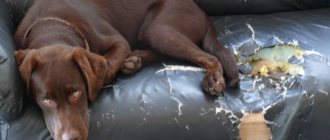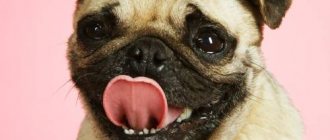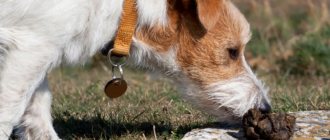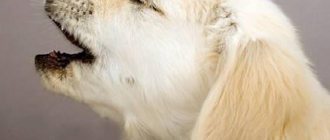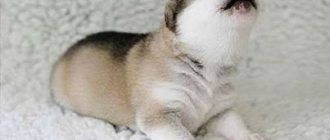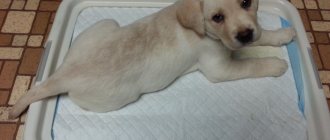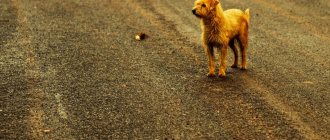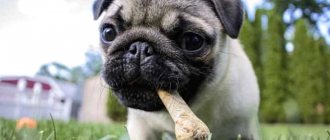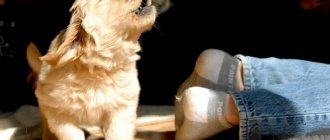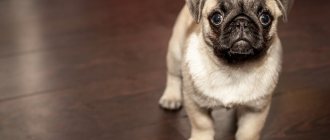Why is coprophagia dangerous in dogs?
Dogs eating feces is a dangerous habit that can lead to infection. The excrement of other animals can contain parasites, viruses and bacteria, so your pet is at risk of contracting the following diseases:
- Parvovirus enteritis
. This pathology is most severe in puppies. As a result of severe diarrhea and constant vomiting, severe dehydration develops, depleting the body.
- Toxoplasmosis
. This disease is equally dangerous for four-legged friends and their owners. Toxoplasma causes a severe blow to the immune system, so it is not always amenable to drug therapy in elderly pets.
- Helminthiasis
. A large ball of helminths is fraught with blockage and rupture of the intestines with subsequent release of the contents into the body. Severe intoxication is fatal.
- Leptospirosis
. The main symptom of Leptospira infection is jaundice. These parasites infect liver cells, causing irreversible pathological changes. Elderly dogs and puppies left without treatment die within the first day.
If you catch your four-legged friend eating other people's feces, try to find out the reason for his perverted preferences. This will help deal with the problem in the future.
General Tips
When teaching an adult dog not to eat feces, owners often make mistakes. And the efforts come to naught. The following recommendations will help you avoid mistakes:
- do not scream, do not hit - such training of a dog is useless, it will aggravate the situation and ruin the relationship, and the intimidated pet will continue the “dirty deeds”, but in secret;
- walk, train and play with the dog every day;
- While the pet is weaning itself from eating feces, a muzzle is put on it during walks;
- if you catch an animal eating feces, do not chase it, do not scold it or coo;
- Don’t poke your muzzle into the piles - the dog won’t understand what’s going on, and its sense of smell will weaken, plus in the future the little tail will get rid of excrement on its own.
Eating feces is an unpleasant habit, but not fatal. With the right approach, it will disappear in 2-3 weeks. If you can’t cope on your own, turn to a dog handler.
Causes of coprophagia in dogs and puppies
For wild dogs, eating feces was an effective way of protecting themselves from predators. Females eating the feces of their puppies destroyed the odorous trail, confusing their pursuers. After domestication, the problem disappeared, and such behavior became unjustified and dangerous.
If a dog eats its own feces, then the reason for its behavior can be explained from a physiological or psychological point of view. Depending on the provoking factor, a veterinarian or animal psychologist may be needed for treatment.
Physiological
Most physiological causes are associated with disorders within the body. These include:
- Parasitosis. Infection with helminths often leads to a perversion of appetite. In addition to excrement, the patient may eat stones, soil and other inedible objects.
- Hunger. If there are long breaks between feedings, the animal may try to kill the worm in any available way.
- Syndrome of impaired absorption in the intestine. This pathology is accompanied by increased gas formation, foul-smelling stools, diarrhea and anemia.
- Hidden infections and gastrointestinal diseases. For this reason, your four-legged pet should first be checked by a veterinarian. Otherwise, weaning from an unpleasant habit may fail.
- Lack of digestive enzymes, vitamins and microelements. The excrement contains beneficial bacteria, so the pet simply replenishes its meager reserves.
If the animal is healthy and well-fed, then the answer will have to be sought in psychology. In the life of a four-legged friend, the attention of the owner plays a huge role, therefore, in its absence, the occurrence of coprophagia is the smallest possible problem.
Psychological
Psychological reasons are directly related to emotions and behavioral characteristics. These include:
- Jealousy
. If a dog is jealous of other pets, he may eat their feces to clear the area of foreign odors.
- Imitation
. After giving birth, the mother is responsible for the hygiene of her babies for a long time. If a puppy eats its own feces, it is simply imitating a more experienced animal.
- Dominant behavior
. Animals that constantly demonstrate their strength and superiority can force other four-legged animals to eat their excrement. Similar behavior from weaker dogs confirms the recognition of the leader.
- Curiosity
. Puppies learn about the world using all their senses. Sometimes they taste completely unexpected things.
- Prolonged stress
. Rare walks are fraught with incontinence. If the owner punishes for leaving piles, then over time the dog will begin to hide the “evidence”.
- Lack of attention
. A pet deprived of the owner’s attention will definitely try to attract him in any possible way. He may begin to damage furniture or bark loudly, disturbing neighbors.
- Competition for food
. A large number of domestic animals is fraught with periodic or constant taking of food. As a result, the dog swallows any stray piece without thinking about the nature of its origin.
Another possible reason is taste preferences. Some four-legged pets are crazy about the excrement of animals of other species, which leads to interspecific coprophagy.
Normal or pathological?
Experts do not consider this animal behavior to be a deviation from the norm. It's not just dogs who eat the excrement of their young. This is why coprophagia occurs more often in females than in males. In the wild, this is justified: in this way the female hides her tracks so that predators cannot find the babies. Ancient innate instincts can awaken in a dog of any breed, even one bred in recent years.
But our animals have been living in warm apartments and houses for a long time, and the instinct to protect their offspring has been preserved. While watching its mother, a small puppy may also eat feces, which, according to some animal psychologists, remind puppies of their first food - warm, semi-solid and semi-digested. Tigresses and lionesses eat this food for their cubs, regurgitating it for them after the hunt.
On the street, puppies watch their friends and relatives and can copy their behavior. Watching playground mates eat feces may cause your puppy to do the same.
Experts distinguish three types of coprophagia:
- autocoprophagy - eating one's own feces;
- intraspecific - eating only dog droppings;
- interspecific - eating the feces of other animals - cats, deer, cows, etc.
Why does a dog eat more than just its own poop?
If a dog eats cat feces, it is likely suffering from nutritional deficiencies. Cat feces are enriched with proteins and microelements, so four-legged pets equate it to a real delicacy.
The excrement of herbivores, containing large amounts of fiber, is no less nutritious. Therefore, in rural conditions, you can often see a dog looking for “tidbits” in horse or cow manure.
From a psychological point of view, coprophagia can be explained by a developed territorial instinct, dominant behavior or jealousy. By getting rid of feces, the dog eliminates traces of a competitor or tries to attract the attention of the owner.
Possible consequences
We figured out why a dog can eat its own feces. You should also know that coprophagia is not actually considered a disease, but rather is classified as simply a nuisance or destructive behavior. In principle, “fragrant heaps” cannot cause significant harm to your pet, but only if we are talking about his own waste products and at the same time your dog is completely healthy.
It should be remembered that, having tried it once and not receiving a ban from the owner, the dog will definitely perform a similar action again and again. And this is already fraught with consequences.
What can enter a dog’s body with feces (even if the dog is supposedly healthy):
- Worms and other parasites . These organisms will slowly “eat” your pet from the inside, harming his well-being, mood, and health. In addition, do not forget that animal worms are transmitted to humans.
- Hazardous substances . For example, those contained in the soil (if this action occurred on the street) or in the floor covering.
- Infections . E. coli, viruses and microorganisms can cause serious health problems for your pet.
Consolidation of the habit of eating your own feces occurs if a person reacts to a problem at the wrong time or incorrectly.
How to stop a dog from eating feces: 6 methods
There is no single method that is suitable in all situations. You will have to deal with the situation through trial and error, based on the characteristics of your pet.
Behavior adjustment
It is better to discuss strained relationships between pets with an animal psychologist. You can help yourself only with enough food and daily monitoring during feeding. This will prevent theft from someone else's feeder.
Try to devote more time to your pet. Even a lap dog needs outdoor play. Do not limit communication to stroking and rare trips outside. Try signing up for agility - this sports discipline will bring you closer and make up for the lack of activity.
If you are very busy at work, you can keep your bored pet occupied with interactive toys. Some owners recommend leaving their pets with the TV on.
Start learning the prohibition commands. Using "ugh" and "don't" can easily prevent you from picking up questionable items while walking. At first, distract your pet with a toy and reward him with a treat. The easiest way is to entrust the learning process to a professional dog handler by enrolling in OKD or UGS courses.
Review of diet and vitamin supplements
If your dog eats feces, find out what it is missing. A lack of vitamins during dry feeding is only possible when using cheap economy-class feed. The raw materials of the lowest quality are used in their production. The composition of such feeds is not balanced. Plant components predominate over meat ones, and animal protein is the main source of nutrition for predators.
With natural feeding, vitamin supplementation is a prerequisite for creating a balanced diet. Get tested to understand what substances your pet needs. Based on the test results and medical history, the veterinarian will be able to select a specific drug.
Timely removal of feces
The best way to combat coprophagia is to eliminate provoking factors. Clean up after your pet while out on walks using bags. This helps clean the city and eliminates the possibility of eating fresh feces, which are of much more interest to animals than dried feces.
If a similar situation occurs at home, but the object of unhealthy love turns out to be cat feces, cut off access to it. Close the door to the toilet or other place where the tray is located tightly, not forgetting to make an opening for the cat.
If there are several coprophages, temporarily distribute them in different rooms. This will prevent repetition one after another while correcting behavior.
It will be more difficult with mother-fed puppies. They cannot be separated until the end of feeding, so only timely removal of feces will help here.
Using a muzzle while walking
Always keep your pet on a leash when other people and animals are around you. This is not only good form, but also an excellent way to stop unwanted actions.
Also, do not forget about the muzzle. Representatives of large breeds are difficult to keep even on a leash. Especially if your child goes for a walk with the dog. Buying a muzzle will simplify walking, eliminating the need for constant monitoring.
Screening for diseases
Sign up for an examination at a veterinary clinic to identify possible hidden pathologies or confirm your concerns if you have alarming symptoms. If an illness is detected, the perverted appetite will disappear on its own after recovery.
Use of special drugs
Eating of feces by dogs is prevented not only by taking vitamin and mineral complexes, but also by special preparations that change the taste of feces. They are divided into 2 types. The former are given to the coprophages themselves, and the latter to the animals whose excrement they consume. In addition to creating a bitter taste, the first type of drug helps to compensate for the lack of enzymes inside the body.
If the problem occurs on the street, then it is better to use spray medications. They are sprayed onto any excrement that interests the dog. Once convinced that it is inedible, he quickly loses interest.
Is this harmful to the pet's health?
By eating cat feces, the dog runs the risk of ingesting helminth eggs and potentially dangerous bacteria that can cause disease. Also in feces may be pathogens of parvovirus enteritis, coronavirus and leptospirosis.
When eating cat feces, the animal develops a stench from the mouth, which can be eliminated by regular brushing of the teeth.
Buy stool repellers
Another way to prevent your dog from eating poop is to use a stool soothing product. They are specially made for dogs who cannot stop eating cat or other feces.
You don't want to kiss your dog once he has perverted his mouth. So, investing in stool repellents will be beneficial for you and your dog, as some products have "breath fresh" features to freshen the mouth.
On the other hand, stool repellents designed for cats may make their stool unattractive to dogs so they can stay away.
Methods used by the owner to combat coprophagia
Having solved the medical side of the issue, you can think about how to wean your dog from this bad habit. The treatment for coprophagia involves the use of behavioral strategies to modify its behavior. They can be divided into three groups:
- prevention tactics;
- reassignment tactics;
- reaction replacement tactics.
Prevention tactics
This method involves placing the dog in an environment where it is not possible for him to get to the excrement. These include the following methods:
- cleaning the yard from excrement before walking;
- walking on a leash using a muzzle.
Reassignment tactics
This includes methods to distract your pet. These include active games, significant physical activity, and training on dog parks. The dog must be trained to obey and rewarded for successfully executed commands. She should have a lot of interesting toys to keep her attention.
Replacing the reaction
It consists of creating a positive behavioral reflex. For example, at the sight of excrement, the dog is given the command “sit”, and, using means of reinforcement, it is reinforced in the form of a conditioned reflex. In this case, at the sight of feces, the animal will sit down without touching them.
There is also another solution to the problem: use products with a strong, unpleasant taste for the dog (pepper or mustard). They can be used to treat feces for a while in order to cause a taste aversion to it in the dog, and then modify behavior. In order for the experience gained to teach the animal correct behavior, the method must be applied systematically. It is necessary to create conditions so that during treatment the dog does not have access to untreated feces. Otherwise, a situation will arise that reinforces the animal’s model of unwanted behavior.
